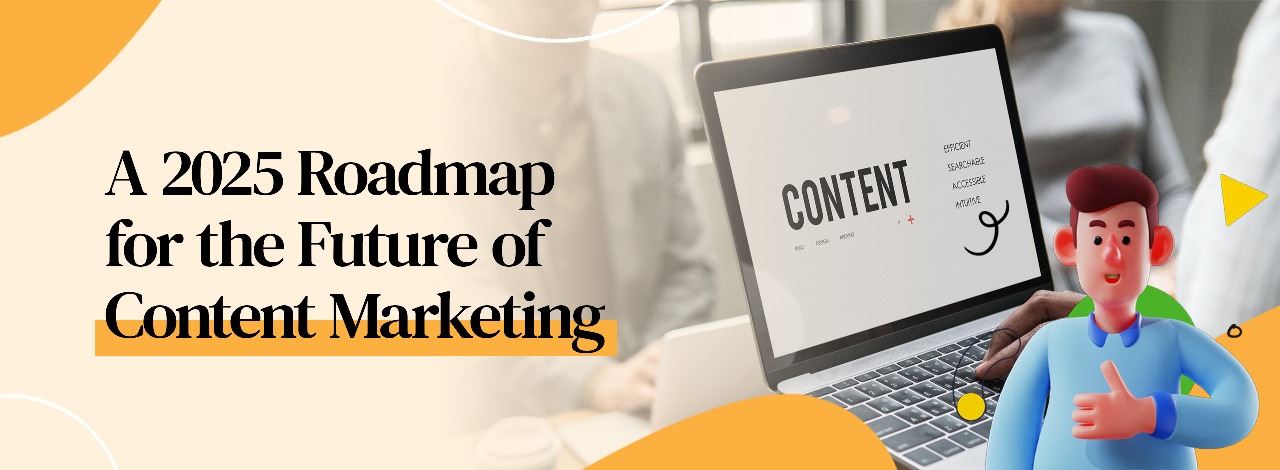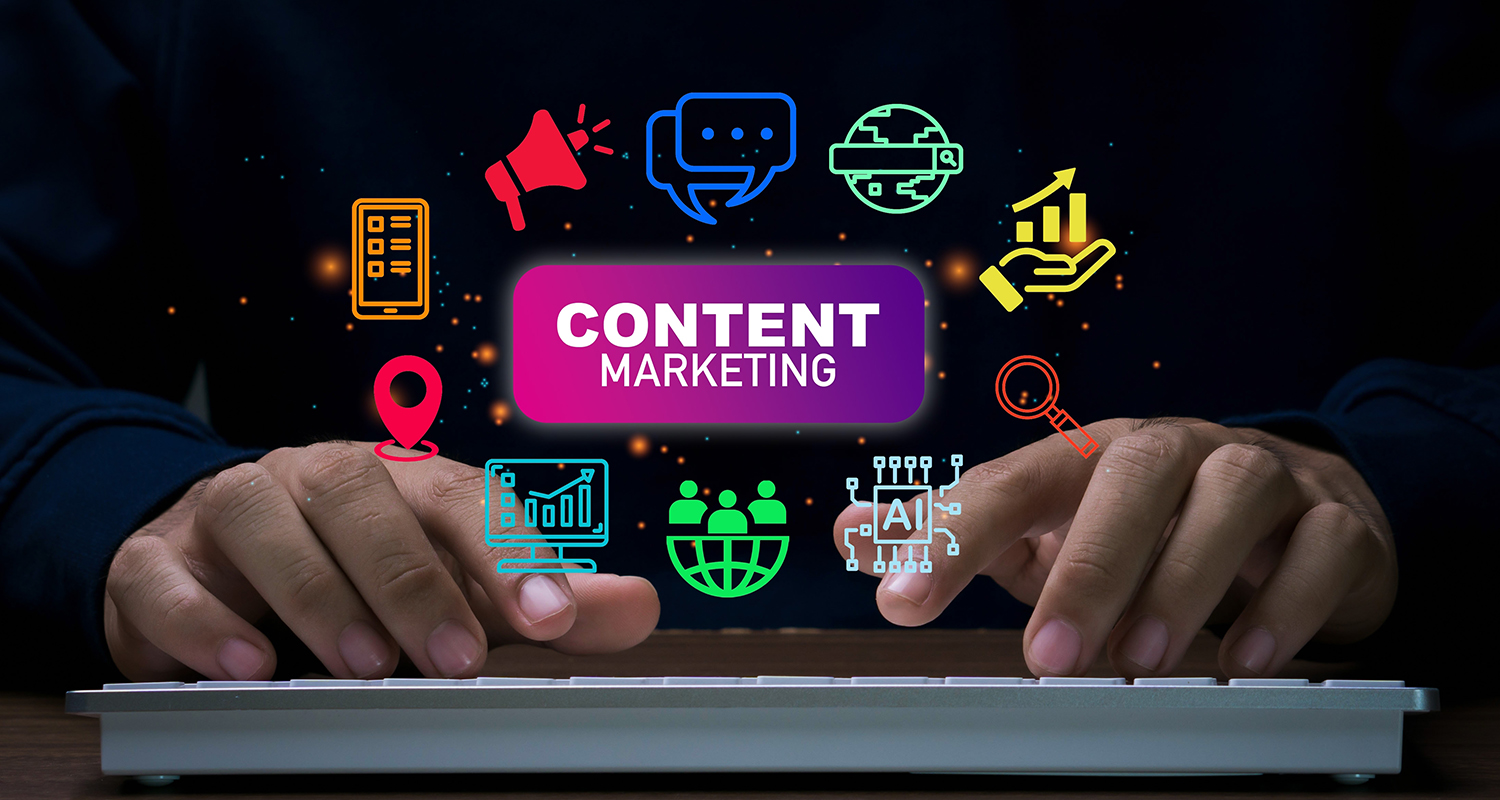


A 2025 Roadmap for the Future of Content Marketing
What will the future of content marketing look like in 2025? Where might it be headed in the coming year? Is artificial intelligence still dominating the content development process?
Content marketing remains one of the most effective strategies to educate your target audience and establish true connections that lead to conversions. 39% of enterprise marketers want to boost their marketing budgets this year compared to 2024.
In this post, we will look at the future of content creation, four content marketing trends that I believe are impacting the business right now, and four forecasts for the coming year.
What are the Current Trends in Content Marketing?

To generate content that resonates with your audience, you must remain on top of emerging trends and shifting consumer preferences.
Here are four current content marketing trends to be aware of as we approach 2025.
1. Zero-Click Searches
Previously, the way we utilized search engines such as Google was much simpler. We'd type in a term, look at the results, and proceed to the website we thought was most likely to provide what we needed.
However, search engines are striving harder than ever to keep users on their platforms.
- SparkToro conducted an intriguing study last year in which just 360 of over 1,000 Google searches in the United States led to a non-Google-owned site. This means that simply ranking in the top three search results is no longer sufficient. They must appear in a zero-click search. Essentially, this is any search in which you receive an answer without having to click on a link.
2. E-E-A-T
More than half of marketers already use artificial intelligence to develop content, with the other half using it to optimize current material.
- While AI technologies are a terrific way to quickly and affordably write articles, social media postings, and email campaigns, they have resulted in a torrent of low-quality, erroneous content on the internet.
- Implementing E-E-A-T (experience, expertise, authoritativeness, and trustworthiness) into your AI content is critical for demonstrating your credentials and encouraging clients to believe in your content.
- Google's quality raters utilize the E-E-A-T framework to analyze whether a page fits a user's needs and expectations.
- High levels of E-E-A-T not only improve your search engine rankings but also demonstrate to clients why they should trust your content, whether it was generated by people or AI.
3. AI
Marketers use AI not only to create content but also to optimize the process.
According to Mailchimp, 43 percent of marketers are currently using AI to automate jobs and processes. AI-powered solutions can help businesses scale their content marketing efforts and free up time to focus on more long-term initiatives.
Of course, while AI can assist save time on repetitive activities, the outputs must still be reviewed on a regular basis to assure quality, consistency, and accuracy. The classic phrase says, "garbage in, garbage out." It is also critical to consider data privacy---do not divulge secret or sensitive information while utilizing AI tools.
4. Short-Form Videos
Do you think content marketing is solely about written material? Think again. In 2025, content marketing will revolve around videos, particularly short-form ones.
- According to HubSpot, short-form video is now the most popular content marketing format for businesses and has the highest return on investment (ROI).
- Why short-form videos? They're simpler to see and understand, easier to develop, and more likely to keep viewers' interest.
- Furthermore, numerous social media-based platforms, such as TikTok, YouTube Shorts, and Instagram Reels, are expressly built to host and promote short video clips.
- The beautiful thing is that you can use short-form videos in any industry, for any audience, and with any tone.
Content Marketing in 2025: What to Expect

Now it's time to whip out my crystal ball and peek into the future. We anticipate that the following four content marketing trends will gain traction in the coming year.
1. AI Will Play a Bigger Role in Data Utilization
We've already discussed how to use AI to produce and plan content.
However, another application of AI will gain popularity this year: data analysis, visualization, and interpretation.
- AI can manage enormous datasets and aggregate various datasets, providing you with the information you need to create high-quality content that your consumers will trust.
- Our team utilizes AI to assist our clients.
2. Search Everywhere Optimization requires content-team collaboration.
While Google is the leading search engine, it is critical to maintain a presence on many internet platforms. This includes social media, forums like Reddit and Quora, AI platforms like SearchGPT, and online stores like Amazon.
- Search everywhere optimization is the process of improving your presence on all of the platforms that your customers utilize.
- While SEO focuses on keywords and search intent, search everywhere optimization is all about discoverability. What can you do to boost the likelihood of people discovering your brand through your content?
- Consider all of the platforms that your target audience uses when implementing search everywhere optimization.
3. Personalization
Personalization has always been a key aspect of content marketing, and it will be even more so in 2025.
- Why? One in every two people is afraid that the increased usage of AI would result in a lack of a human being to communicate with when they contact a firm.
- You may utilize personalization to produce tailored content for customers, boosting their satisfaction and trust in your business.
- As a result, they're more likely to purchase from your firm. For example, personalized call-to-actions outperform non-personalized ones by 202 percent.
- Good data is essential for personalization---the more data you have, the higher-quality content you can generate.
- Ironically, while AI is often associated with a lack of human connection, it may also be used to personalize material.
4. Experiment with different content types.
2025 is the year to think beyond the box. To keep ahead of the competition, you'll need to examine new content formats in addition to evaluating your presence on other platforms.
Diversifying content forms increases audience reach, engagement, and backlink chances.
Which content formats should you consider? It depends on your objectives, budget, and target audience. Some content kinds you may not have considered before include:
- Webinars: Useful for creating a community around your brand and generating leads.
- E-books and white papers: Useful for demonstrating your knowledge and delivering long-term value to customers.
- Infographics: Useful for increasing brand recognition and building backlinks.
- Podcasts: Useful for targeting certain audiences and interacting directly with customers.
- Quizzes: Useful for gathering data and giving clients personalized experiences.
Conclusion
As we move into 2025, content marketing will evolve significantly with the rise of AI, increased focus on personalization, and the importance of adapting to changing consumer behaviors. The future will see a shift towards data-driven decisions, innovative content formats, and seamless integration across platforms for greater discoverability. Marketers must stay ahead of the curve by embracing these changes and ensuring they create engaging, relevant, and value-driven content. By incorporating AI, optimizing for search everywhere, and diversifying content types, businesses can build stronger connections with their audiences, boosting engagement and conversion rates.
Frequently Asked Questions
What are zero-click searches, and why do they matter?
Zero-click searches provide answers directly on the search results page without needing to click through to a website. It highlights the need for content to be featured directly on search engines.
Why is personalization important in 2025 content marketing?
Personalization enhances customer engagement and trust, leading to higher conversion rates by tailoring content to meet individual preferences.
How can businesses use AI to improve content marketing?
AI can automate content creation, personalize experiences, analyze consumer data, and optimize content performance for better targeting and engagement.
Why is content team collaboration important for "Search Everywhere Optimization"?
Collaboration ensures content is tailored and optimized for all platforms your target audience uses, from search engines to social media and forums.
How can I stay ahead of content marketing trends in 2025?
Stay informed about emerging technologies, consumer behavior shifts, and platform changes. Continuously test new content types and optimize your strategy based on performance data.
